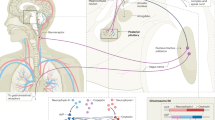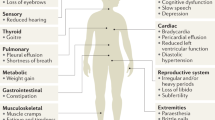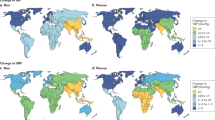Abstract
IT has been shown1 that during a prolonged stay at altitudes above 15,000 ft. there is an increase in the salivary excretion of sodium and a decrease in that of potassium. In one subject this change in salivary electrolyte composition showed a marked acclimatization effect (Fig. 1). These findings suggested that, on arrival at a high altitude, the level of circulating aldosterone was likely to be greatly reduced, but that there would probably be a tendency for it to return slowly towards normal values with passage of time.
This is a preview of subscription content, access via your institution
Access options
Subscribe to this journal
Receive 51 print issues and online access
$199.00 per year
only $3.90 per issue
Buy this article
- Purchase on Springer Link
- Instant access to full article PDF
Prices may be subject to local taxes which are calculated during checkout
Similar content being viewed by others
References
Williams, E. S., Clin. Sci., 21, 37 (1961).
Williams, E. S., and Edwards, R., Middlesex Hosp. J., 60, 167 (1960).
Ayres, P. J., Garrod, O., Simpson, S. A., and Tait, J. F., Biochem. J., 65, 639 (1957).
Rundo, J., Proc. Second Int. Conf. Peaceful Uses of Atomic Energy, 23, 101 (1958).
Author information
Authors and Affiliations
Rights and permissions
About this article
Cite this article
AYRES, P., HURTER, R., WILLIAMS, E. et al. Aldosterone Excretion and Potassium Retention in Subjects living at High Altitude. Nature 191, 78–80 (1961). https://doi.org/10.1038/191078b0
Issue Date:
DOI: https://doi.org/10.1038/191078b0
This article is cited by
-
The effect of high altitude on saliva aldosterone and glucocorticoid concentrations
European Journal of Applied Physiology and Occupational Physiology (1989)
-
Influence of exposure to moderate altitude on the plasma concentration of cortisol, aldosterone, renin, testosterone, and gonadotropins
European Journal of Applied Physiology and Occupational Physiology (1980)
-
Effects of high altitude exposure on components of blood and urine in mountaineers
International Journal of Biometeorology (1974)
Comments
By submitting a comment you agree to abide by our Terms and Community Guidelines. If you find something abusive or that does not comply with our terms or guidelines please flag it as inappropriate.



